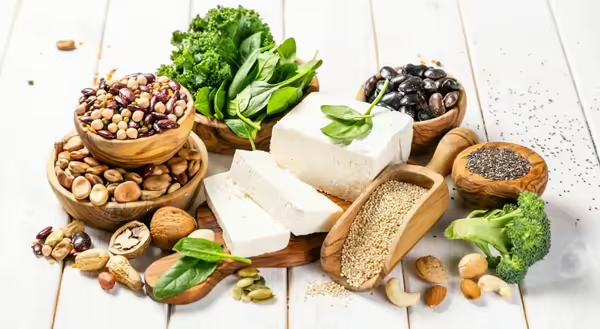
More interest has surrounded meat alternatives and reducing the use of animal products recently. One concern about meat alternatives is they may not provide enough protein to meet protein needs. However, that is not the case. Plant proteins can be excellent sources of protein. Plant proteins are also full of vitamins, minerals, and other nutrients that make them a healthy choice. Plant proteins are full of fiber which can help keep you full longer, curb cravings, and aid digestive health. That’s not all fiber can do. The soluble fiber found in plant proteins can help lower cholesterol. High cholesterol is a risk factor for stroke and heart disease.
The Mediterranean diet, one of the USDAs healthy eating patterns, emphasizes consuming protein from plant sources versus animal protein. Studies have shown that the Mediterranean diet is associated with positive health outcomes compared to the standard American diet. For more information on the Mediterranean diet check out our pages on Healthy aging with the Mediterranean eating pattern and Give your meals a Mediterranean makeover.
Here are a few plant proteins that contain a good amount of protein per serving and some fun cooking tips. Scroll down for a printable handout with recipes.
Soy
Soy is a complete protein, meaning it has all the necessary amino acids needed for building proteins such as muscle. This amazing little bean is rich in isoflavones than may lower the risk of heart disease, especially in women. Soy protein comes in many forms.
Edamame (ay-duh-MAH-may) are immature soybeans with a slightly sweet flavor. Boil, steam, or panfry them and add your favorite seasoning for a tasty healthy snack. Parmesan edamame is great on salads. See the recipe below.
Tofu is made from bean curds pressed together to form a block. The firm varieties can be sliced and pan-fried. They soak up the flavor of the foods around them and are great in stir-fry.
Soy beverages are also a great alternative. They have a sweet nutty flavor that is great in cereals, smoothies, and in your morning coffee.
A 3.5 ounce serving provides 10-19 grams of protein!
(Parmesan Edamame recipe in PDF below)
Quinoa
Quinoa (KEEN-wah), an ancient grain, is a complete protein. Quinoa is rich in magnesium. Magnesium helps relax blood vessels, which can alleviate migraines and help with high blood pressure. They are great in soups or as a substitute for rice. Sprinkle some on the bottom of pizza crust before baking. It gives a great crispy texture. Try the Asian quinoa recipe the next time you make stir fry (recipe in PDF below).
Quinoa provides 8 grams of protein per cup!
Beans and Lentils
These plant proteins are often overlooked. Beans and lentils are a healthy choice because they contain phytochemicals that can protect against cardiovascular diseases and certain cancers. Beans and lentils are versatile and can be added to many dishes. Lentils’ small size make them an easy addition to soups and casseroles.
Beans provide about 20 grams of protein per ½ cup and lentils provide 9 grams per ½ cup.
(Cowboy Caviar and Minestrone with Lentils recipes in PDF)
Take Home Message
Plant proteins are a great way to mix up your protein intake. They’re heart healthy, great for digestion, and easy on the wallet. Consider ways you can incorporate them into the recipes you already make. Try topping your salads with edamame, replacing white rice with quinoa, or adding beans and lentils to your soups. These examples can be a guide for anyone who wants to add more plant-based protein into their diet. Download and print this Plant-Based Protein Recipe Packet for delicious and nutritious ways to incorporate more plant proteins into your diet today!
For current nutrition information and up-to-date food preservation webinars, check out the University of Illinois Extension Nutrition & Wellness page.
Source: This post was written by Lindsey Kabat, dietetic intern, working with Kristin Bogdonas, nutrition and wellness educator, serving Henry, Mercer, Rock Island and Stark Counties.
References:
Position of the Academy of Nutrition and Dietetics: Vegetarian Diets. EatRight, Academy of Nutrition and Dietetics. Dec 2016.
Building Muscle on a Vegetarian diet. Eatright, Academy of Nutrition and Dietetics. October 15, 2019.
Vegging Out: Tips on Switching to a Meatless Diet. Eatright, Academy of Nutrition and Dietetics. February 24, 2020.